Even though automotive factories are among the most advanced and automated on the planet, when a vehicle leaves the factory floor the logistics process is typically analogue, and therefore inefficient and expensive. That has all changed for Kia Israel now that the company has embraced virtual logistics
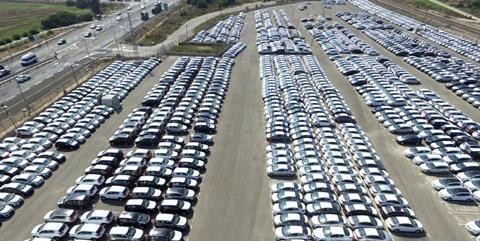
Every automotive manufacturer faces similar problems when it comes to their finished vehicle logistics, namely, how to find and track parked cars among thousands of identical models without any unique or easily distinguishing features, such as a number plate.
Yet, if Covid-19 has taught us anything, it is that the power of digital technology, realised through the cloud and the Internet of things (IoT), can provide the solution to equally tough challenges and even keep whole sectors, from medical to office-working to grocery-shopping, viable during lockdown after lockdown.
The automotive industry saw this once-in-a-lifetime pandemic undermine new car sales but times will get better as the crisis recedes. That is because there is likely to be a surge in new car sales as pent-up demand is released. By digitising the supply chain, the automotive sector will find it easier to find and track the vehicles needed to meet record shipments.
The alternative, sticking with a conventional analogue outbound supply chain, would see a return to the delays and inefficiencies in finding and tracking finished cars; delays and inefficiencies that ultimately push up delivery costs. Those are the same costs that quickly eat into the already wafer-thin profit margins of the automotive industry. Hold-ups in delivery also run the very real risk of disappointing an excited end-customer on delivery day. That is a customer that nowadays will be only too quick to air their frustrations on social media, with all the damage that can do to the ‘years to build, moments to ruin’ brand reputation.
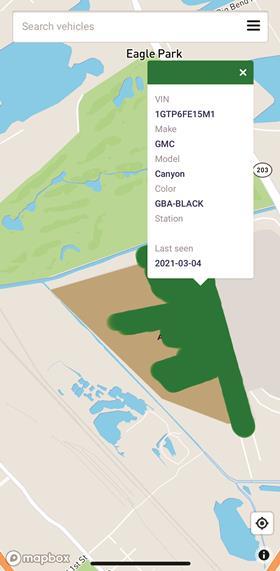
The good news is that there is now a digital logistics solution that claims to be much simpler to install and implement than most auto makers may realise based on their previous experience.
Kia Israel, for example, has adopted a pioneering ‘hardware-less’ finished-vehicle asset tracking solution that claims to not only be able to locate and track individual cars, but also continuously monitor their status. By doing so Tel Aviv-based Telcar, the exclusive distributor of Kia cars for Kia Israel, says it has been able to optimise its entire logistics supply chain by eliminating human error, maximising efficiency, significantly reducing costs, and keeping end customers happy on delivery day.
Ditching the clipboard
Managing a bonded lot is no trivial task. Conventional working practice is to write down the location of the vehicle on a piece of paper once it is parked. However, that system is flawed because it relies on human input and is thus subject to error.
The result is that vehicles are often not parked where they are recorded as being parked. This forces lot staff to wander around the last known approximate location scanning all the vehicle identification numbers (VIN) of cars without licence plates in the hope they can find the misplaced one. Industry insiders tell stories of occasions when staff have searched for several days to locate vehicles. This is not a good way to conduct an automotive logistics operation.
Kia Israel conducted its business it a somewhat more efficient fashion but it nonetheless suffered from supply-chain challenges for years: “Like most automotive logistics managers, I’d experienced many stress-induced sleepless nights from not knowing the status of finished cars in my supply chain,” admits Asher Ben-David, automotive logistics manager for the company.
“Conventional working practices involved writing down the location of a vehicle on a clipboard once it was parked, but with the best will in the world people still made mistakes,” says Ben-David.
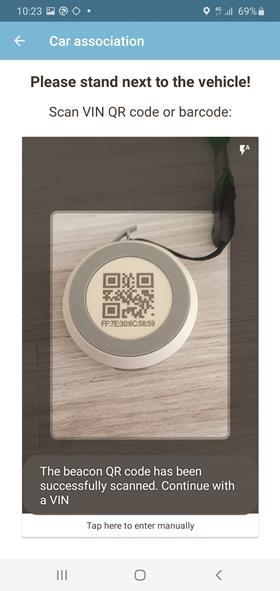
“In addition, vehicles were parked so tightly that it could mean moving several vehicles to get to a specific one,” he continues. “Not only are the moved vehicles then also prone to being put back in the wrong place but the whole process was entirely haphazard. This meant there was no intelligence or visibility of the optimum way to park vehicles so priority easy access was given to the ones that would need to move the soonest.
“In fact, so much time was being wasted manually searching for and moving finished vehicles that we were forced to recruit more people to plug this source of inefficiency in our operations. This just further increased our operational costs,” says Ben-David.
Like many automotive logistics managers, Ben-David knew he had a problem, but was fearful about how expensive and complicated it would be to digitise the factory-to-customer delivery of Kia Israel vehicles.
“I’m not particularly technical and nor are the majority of my logistics staff,” he says. “The last thing I wanted to do was install lots of specialised or proprietary hardware and software. And even worse, then spend weeks trying to understand how to use it properly and months trying to teach my staff how to use it.
“We’ve had bad experiences in the past, so I was not keen to try yet another solution that promised the world and delivered anything but. I felt trapped with an analogue system I knew wasn’t working but unable to access a digital one, even if it could potentially relieve a significant amount of pressure within our operations.”
The Kia Israel challenge
The answer to Ben-David’s problems came in the form of a pioneering virtual logistics solution from Tel-Aviv based ViLOG. While its solution is applicable to many other logistics problems, ViLOG has initially focused on the automotive sector. Its first product is dubbed Automotive Logistics Intelligence (ALI) – a name that perfectly sums up the product’s strengths.
The company introduced ALI to solve the factory-floor-to-customer-door finished vehicle delivery and management challenge once and for all. In short, it continuously provides definitive answers for automotive logistics managers, including automatically showing them and their staff how to run their business in the most optimised way.
By leveraging the power of the modern smartphone, along with cloud-based AI and machine learning, ALI creates and maintains a real-time digital twin of the customer’s logistics operation. Data inputs from any existing manual/analogue or digital source can still be used and constantly enhance the system’s knowledge. But the true power of ALI is in its AI-powered intelligence. The insights the platform offers facilitate powerful operational refinements and efficiency gains at all stages of the automotive logistics business. And this is all possible without requiring any time consuming and complex network installation or hardware.
The benefits are not limited to experienced automotive supply chain staff. Armed with a smartphone and the ViLOG ALI app, any member of staff, no matter what their role, can access the system to make their job easier and more efficient. For example, employees can move vehicles around the lot quickly and park them in ideal locations for rapid near-future retrieval. And while it is a simple and smart asset tracking solution, ALI knows far more about the asset than just its location. The platform knows what has happened to the vehicle in the past, what is happening right now and what will happen, or need to happen, in the future to keep the logistics operation running smoothly to schedule.
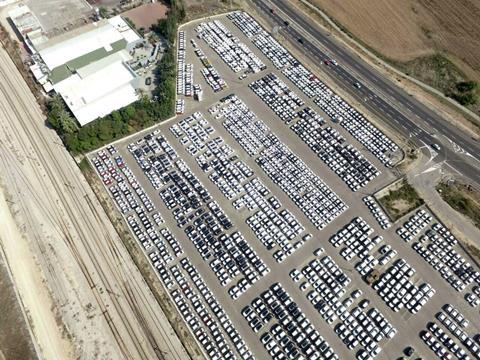
Determined to significantly improve the efficiency of his company’s supply chain, Kia Israel’s Ben-David issued a challenge to ViLOG: to demonstrate how the company’s ALI product shortened the time it takes to locate a specific vehicle among the thousands in Kia Israel’s bonded lots and port locations from hours to minutes, without adding scanners, gates, base stations, or other expensive or specialist hardware or infrastructure.
Kia Israel deals with up to 10,000 cars on two bonded parking lots (one indoor, one outdoor). Vehicles can be on the lot for durations ranging from several days to up to a year. The logistics operation is a complex pipeline with multiple vehicle processing stations across both parking lots and between 200 and 700 daily vehicle movements.
While that made Kia Israel’s logistics management a tough challenge for most asset-tracking solutions, it was easily solved by ALI. Behind the scenes the platform is highly sophisticated, yet for the customer it couldn’t be simpler and quicker to implement. Better yet, ALI paid for itself by not only solving Kia Israel’s problems immediately after installation, but also by continuing to optimise the company’s entire logistics function as the digital twin gained greater insights into the real operation’s challenges.
Immediate efficiency gains
From the very first day, Kia Israel’s staff noticed significant benefits. For example, once the system had been installed, a process that required no technical knowledge and minimal training time, staff simply needed to type the VIN into the ViLOG smartphone app which then guided them to the precise parking spot in just the time it took to walk directly there.
While ALI requires no hardware to operate, customers can choose to supplement the platform with input from legacy systems such as cameras and proximity sensors. In Kia Israel’s case, for example, each vehicle in the lot was fitted with a compact, battery-powered Bluetooth wireless beacon. The beacons send out a unique identifying ‘ping’ to any close-by smartphones. The information gathered could then be used to continually enhance the positional information for all the vehicles in the bonded lot.
An analysis by Kia Israel of the effectiveness of the ViLOG ALI system found that because vehicles were located virtually instantly, there was a 20-40% reduction in the time to process a car, a 50% drop in labour expense, and a reduction in storage costs of between 25-40%.
But perhaps the most startling revelation was that the time taken to process and deliver a car to a customer was reduced by 48 hours per vehicle. With 10,000 cars on the bonded lot, the system has the potential to cut an estimated 55 years off accumulative customer wait-time, along with less stressed, more productive lot staff and zero disappointed end-customers.
Now, if for any reason a car’s delivery is going to be delayed, ALI will automatically detect this and the customer can be notified days or weeks before and given a new delivery day. “For us, ‘no-shows’ on customer delivery days are now a thing of the past,” adds Ben-David.
Other benefits brough by ALI include a simplified onboarding process, real-time visibility of the vehicle pipeline, annual stock-taking completion reduced to just one-and-a-half days and shorter timelines for vehicle release to customers.
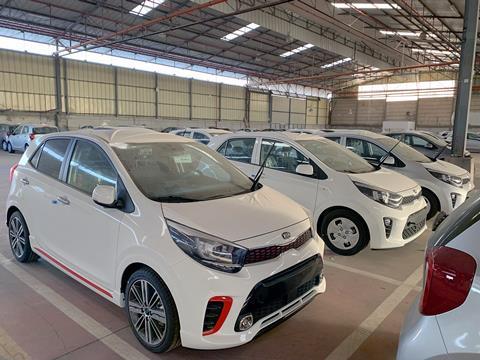
“The system enables well-informed process optimisation thanks to better visibility into such metrics as storage and processing time per vehicle,” explains Gil Messerman, ViLOG’s chief technology officer (CTO). “It also allows for improved resource planning thanks to historical insights.
“We don’t think anyone apart from ViLOG is doing anything close to this in the finished vehicle automotive logistics industry today,” says Messerman. “That makes ALI the unique answer to a longstanding problem that was crying out for a completely new and modern solution.”
As pleased as the Kia Israel distributor is, the best is yet to come for Telcar. The power of ALI is that it leverages AI and cloud resources so the more it learns about the logistics operation the greater the optimisation. Every day, efficiency climbs, costs continue to fall, and customer expectations are not only met, but exceeded.
“I can see a day in the future when customers will be given a precise date and time for the delivery of their car by text message,” reflects Messerman. “For example, your new car is being detailed for final collection and will be ready for you to collect in 21 minutes displayed as a countdown timer.
“This is what home food delivery companies have been doing for several years now on smartphone apps. So, customers are completely familiar with receiving such detailed status updates and will love the functionality being extended to their cars,” says Messerman. “And, of course, it doesn’t need to stop at delivery day, it can also be extended to servicing days, and the collection and return of loan and demonstration vehicles. Car rental companies would stand to benefit enormously too. This is the future of automotive logistics.”
And for Ben-David: “I can’t remember the last time I went to bed and couldn’t sleep because my mind was full of thoughts about finding missing cars. It genuinely was nightmare-inducing! But not anymore.”
Find out more about the ViLog system
Gil Messerman is chief technology officer and co-founder of ViLOG CTO







































No comments yet